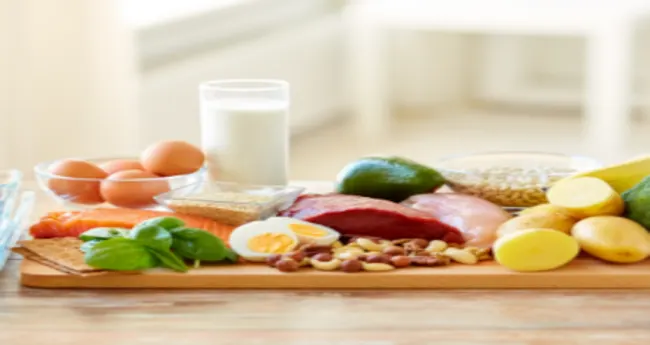PCOS Diet: Foods to Eat and to Avoid

Polycystic ovary syndrome (PCOS) is a common health condition faced by women of childbearing age causing hormonal imbalance, ovarian cysts , irregular periods and problems with metabolism. PCOS can also lead to other serious health challenges such as diabetes, cardiovascular problems, depression, and increased risk of endometrial cancer.
With certain dietary and lifestyle changes you can manage the symptoms of PCOS. You can consult your doctor, who would suggest a customised PCOS diet plan for you. This will in help in reducing the symptoms and preventing potential complications associated with the condition such as hormonal imbalances, insulin resistance, and inflammation.
How diet affects PCOS
Here’s how a PCOS treatment diet can help:
1. Regulates Hormone-Related Issues -
The focal issue of PCOS is hormonal disruption or imbalance, specifically high levels of androgens like testosterone in females. This results in symptoms such as abnormal hair growth, acne, trouble getting pregnant, and weight gain. Most women with PCOS are overweight or obese and have insulin control issues. By avoiding or inefficiently managing hormonal imbalances you end up increasing your risk of heart disease, high blood pressure, and certain cancers. Eating foods part of a PCOS diet plan will help in regulating hormones.
2. Maintaining healthy weight -
A customized PCOS diet will help in managing weight and ensure maintain a healthy weight as per your BMI.
3. Reducing Inflammation -
PCOS is linked to obesity and inflammation. Women with PCOS are more likely to be overweight or obese, and inflammation is linked to obesity. Hence sticking to a solid PCOS diet will help in combating inflammation as well. Women with PCOS will notice that consuming anti-inflammatory foods like tomatoes, leafy greens and tree nuts will help manage their symptoms.
Diets for PCOS
Here are the most common and best diets for PCOS that aid in weight loss and management. It is important to consult your doctor and dietician before you adopt any particular diet as they know what will suit your needs the best.
1. The DASH diet :
The Dietary Approaches to Stop Hypertension (DASH) diet helps decrease the risk of heart disease and is also known to manage PCOS symptoms. Typically, a DASH diet includes fish, poultry, fruits, vegetables, whole grain, and low-fat dairy produce. Foods that are rich in saturated fat and sugar are avoided in this diet.
2. Anti-inflammatory diets :
As the name suggests, this diet includes foods that are anti-inflammatory in nature and help manage inflammation-related symptoms such as fatigue. These include berries, fatty fish, leafy greens, and extra virgin olive oil.
3. Low glycemic index eating plans :
Foods with a low GI are digested by the body more slowly. This means that it does not cause insulin levels to rise as much or as quickly as carbohydrates. Whole grains, legumes, nuts, seeds, fruits, starchy vegetables, and other unprocessed, low-carbohydrate foods make it to the list of a low GI diet.

An ideal PCOS diet plan:
Natural, unprocessed foods
Foods that are rich in fibre
Fatty fish such as salmon, tuna, sardines, and mackerel
Dark, leafy greens such as kale and spinach
Dark red fruits, such as red grapes, blueberries, blackberries, and cherries
Broccoli and cauliflower
Dried beans, lentils, and other legumes
Healthy fats, such as olive oil, as well as avocados and coconuts
Nuts, including pine nuts, walnuts, almonds, and pistachios
Dark chocolate in moderation
Spices, such as turmeric and cinnamon
Foods to avoid if you have PCOS
Typically, women on a PCOS diet should avoid foods like:
Refined carbohydrates, such as mass-produced pastries and white bread
Fried foods, or fast food
Sugary beverages, such as sodas and energy drinks
Caffeine-rich beverages
Processed meats, such as hot dogs, sausages, and luncheon meats
Solid fats, including margarine, shortening, and lard
Excess red meat, such as steaks, hamburgers, and pork
While you manage what foods are best for you when you have PCOS, also remember to stay prepared at all times when it comes to your menstrual needs. Keep a stock of your favourite Always pads with you. You can try the ALWAYS Platinum Ultra Thin Pads which offer the best comfort and protection. These pads have a combination of innovative micro-cushions and an ultra-absorbent core, which instantly locks in the wetness. They are extra-long and powered with odour neutralising technology so that you always stay fresh and clean. You could alternatively also use tampons like the ALWAYS Tampax Compak tampons. It has innovative absorption channels that quickly lock in discharge and hold it in for longer. The protective skirt at the bottom of the tampon eliminates the risk of leakage.

Timing is key
Along with eating healthy, it is equally important to be disciplined about following a structure. Plan several well-balanced, nutritious, meals each day and restrict snacking if you are trying to manage your weight with a PCOS diet.
Remember not to go more than a few hours without eating. A regular and structured eating routine will help in stabilising your blood sugar levels. This, in turn, will prevent food cravings, snacking, and overeating.
Special needs
In case you are trying to get pregnant or are currently pregnant or breastfeeding, you are bound to need more nutrition than usual. Talk to your doctor who may alter your PCOS diet or recommend supplements during this time to ensure you are properly nourished.

Other lifestyle changes
Apart from your diet, incorporating certain lifestyle changes can also help manage PCOS. Below are some suggestions:
Regular exercise
Managing stress levels
Restricting alcohol consumption
Takeaway
Even though there’s no cure, it is possible for a person with PCOS to reduce their symptoms by adopting a healthy diet and becoming more physically active.
Now with Always Period calculator, calculate your next period and track your ovulation period.
FAQs
What foods to avoid if you have PCOS?
Refined carbohydrates, such as mass-produced pastries and white bread, fried foods, sugary beverages, caffeine-rich beverages, processed meats, such as hot dogs, sausages, and luncheon meats among other foods must be avoided if you have PCOS.
What is best diet for PCOS?
A good PCOS diet plan must include natural, unprocessed foods, fibre-rich foods, fatty fish such as salmon, tuna, sardines, and mackerel, dark, leafy greens such as kale and spinach, dark red fruits, such as red grapes, blueberries, blackberries, and cherries, broccoli and cauliflower among others.
Is coffee good for PCOS?
Coffee leads to a rise in estrogen hormone levels during the follicular phase of the menstrual cycle. Since coffee increases the risk of hormonal imbalance, it is amongst the food to avoid for women with PCOS.
Disclaimer
Please note the date of last review or update on all articles. No content on this site, regardless of date, should ever be used as a substitute for direct medical advice, diagnosis or treatment from your doctor or other qualified clinician. Always is committed to ensuring that all of our products meet rigorous safety standards; Always pads prioritize safety, protection and comfort of its consumers.




